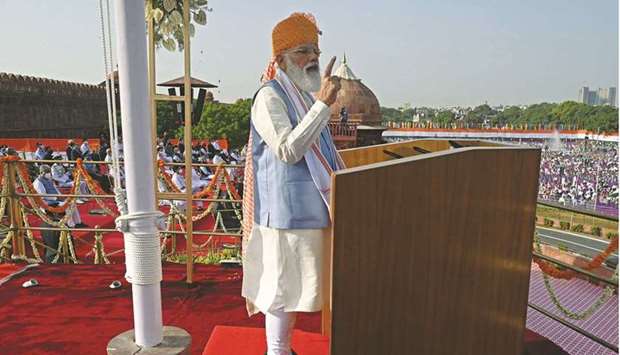India will launch a Rs100tn ($1.35tn) national infrastructure plan that will help generate jobs and expand use of cleaner fuels to achieve the country’s climate goals, Prime Minister Narendra Modi said yesterday.
The infrastructure programme, called “Gati Shakti”, will help boost productivity of industries and boost the economy, Modi said.
The prime minister addressed the nation from New Delhi’s 17th century Mughal-era Red Fort to mark the 74th anniversary of India’s independence from British rule. He said the infrastructure plan will create job opportunities for millions of Indian youth.
“We will launch a masterplan for Gati Shakti, a big programme...(it) will create job opportunities for hundreds of thousands,” Modi said.
While Modi did not announce details of the plan, he said the plan will help local manufacturers compete globally and create new avenues of future economic growth.
Boosting infrastructure in Asia’s third largest economy is at the heart of the Modi’s plan to pull back the country from a sharp economic decline worsened by the Covid-19 pandemic.
In the last fiscal year, India’s economic output fell by a record 7.3% and a second wave of Covid-19 has delayed economic recovery.
Economists fear there will be no rebound similar to the ones seen in the US and other major economies.
The prime minister also set a target to become energy independent by 2047, saying the goal can be achieved through a mix of electric mobility, moving to a gas-based economy and making the country a hub for hydrogen production.
Modi said the country spends more than Rs12tn rupees annually on energy imports and becoming energy independent was critical, as he also announced the launch of a National Hydrogen Mission to boost the government’s clean energy plans.
“India is moving fast towards achieving its climate goals,” he said.
Modi added India was committed to meeting targets for the reduction of its carbon footprint.
In his 90-minute speech, Modi also listed his government’s achievements since 2014 and hailed India’s coronavirus vaccination campaign.
“We are proud that we didn’t have to depend on any other country for Covid-19 vaccines. Imagine what would have happened if India didn’t have its own vaccine,” he said.
India has given more than 500mn doses of vaccines but its vaccination drive has been marred by its slow pace.
About 11% of eligible adult Indians have been fully vaccinated so far.
During his address, Modi paid tributes to those who have died of the coronavirus, saying “the pain of losing them will stay with us forever.”
Praising healthcare workers and scientists for their contribution during the pandemic, he said the country worked with “extraordinary pace” in every area during the crisis.
Nearly two-thirds of the 430,000 deaths due to Covid-19 that India has recorded took place during a lethal second wave in which the country’s health infrastructure was overwhelmed. A huge shortage of oxygen and hospital beds, even in cities like New Delhi, with the country’s best medical infrastructure, left many families struggling to get oxygen supplies and hospital beds.

India’s Prime Minister Narendra Modi addresses the nation from the ramparts of the Red Fort during the celebrations to mark country’s 75th Independence Day in New Delhi yesterday.
